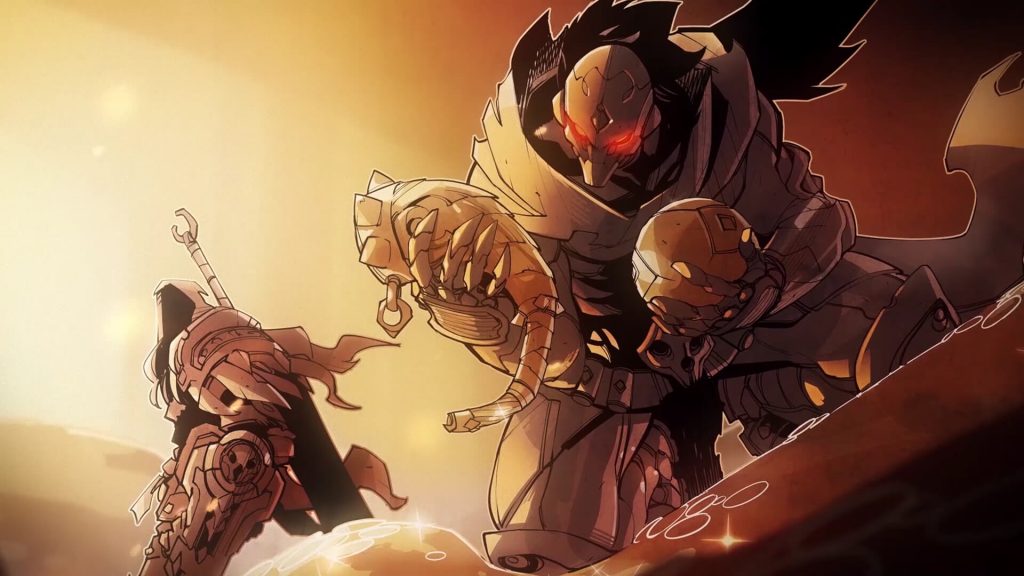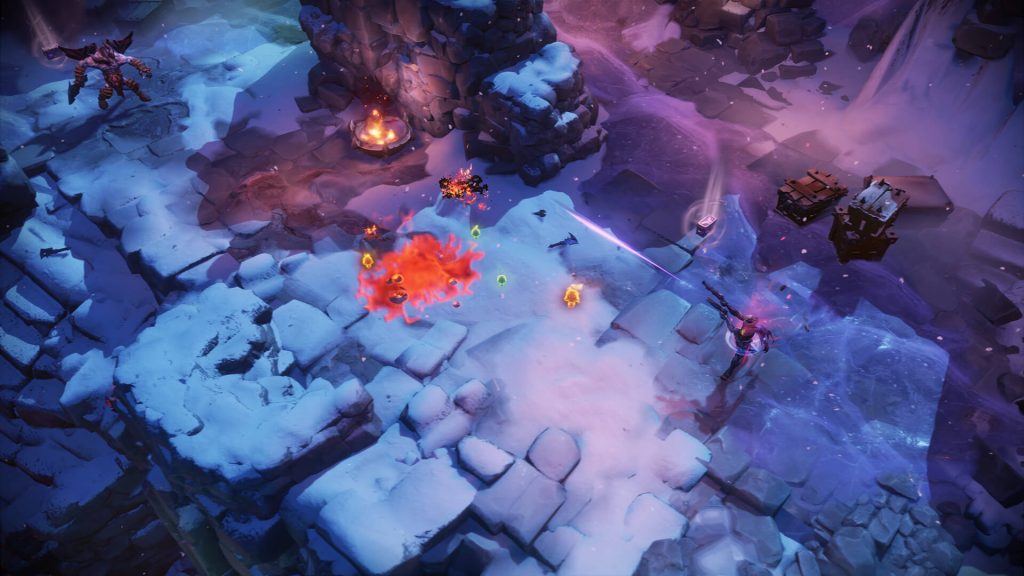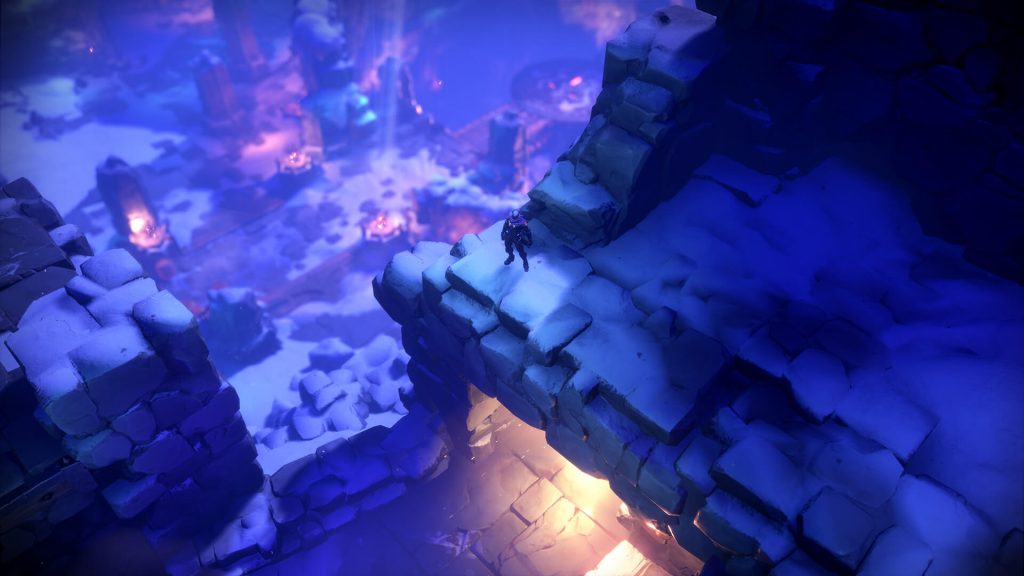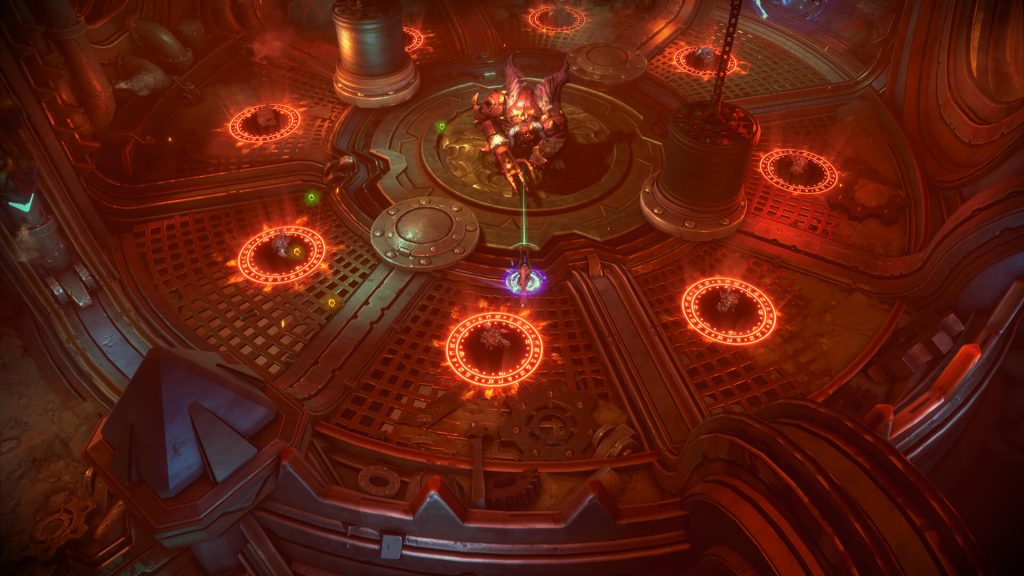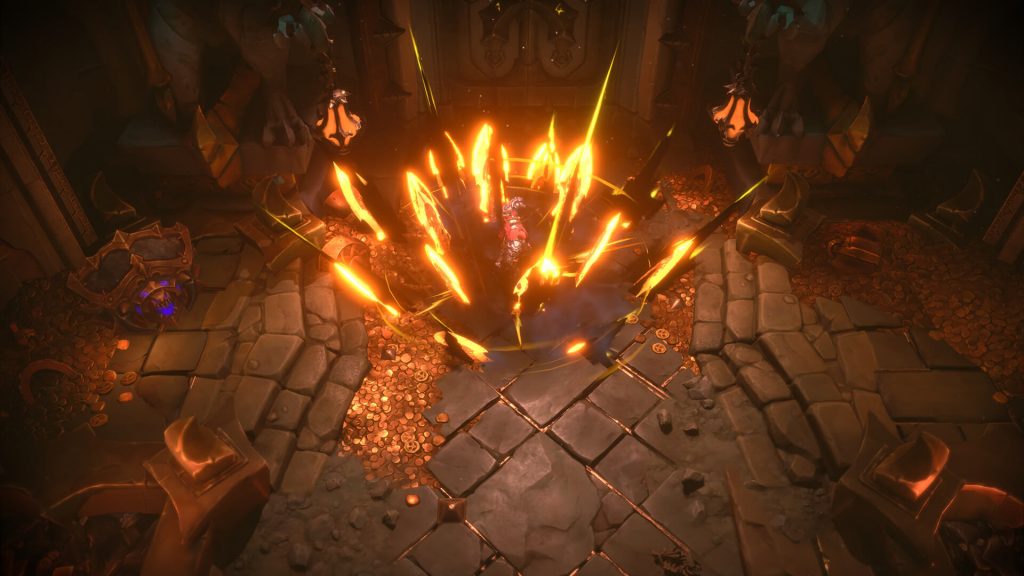
Darksiders has always been kind of a weird series. It never stands still, moving from genre to genre, tackling whatever the studio working on it – be it the late Vigil Games, Gunfire Games, and now Airship Syndicate – wants it to be. The original was a clear homage to Zelda; the second was a love letter to loot-based, open world action RPGs, and the third very much wanted to be a From Software game. The crazy thing is, all of them worked. Genesis is something else again, merging the best parts of Darksiders and Darksiders II with a little bit of Diablo. And once again, it still works. And most importantly, it feels like Darksiders.
As its subtitle implies, Genesis takes place before the original game, right after the Four Horsemen of the Apocalypse – in this case, War, Death, Fury, and Strife – have killed all of the Nephilim, who were half-angel and half-demon and the former brothers and sisters of the new Horsemen – after they tried to take Eden from humanity. Their work done, The Charred Council, a group of fiery talking heads responsible for maintaining The Balance between Heaven, Hell, and Earth, has called them back and given them a new mission. It seems that Lucifer, Lord of all Hells, is plotting to upset The Balance again, so the Horsemen have to figure out what he’s up to and stop him. With Death and Fury off handling other things, the duty falls to War and Strife. Before you know it, they’re rampaging around Hell, causing all kinds of ruckus.
Darksiders’ story has always been pretty silly, and full of proper nouns, but it’s generally pretty engaging despite all that, and Genesis does a good job of spinning its yarn through dialogue, and a series of beautifully drawn cutscenes. The core issue remains the same that every game in the series has had since the original game: it doesn’t actually advance the story. Darksiders ends on a compelling cliffhanger and a promise of more to come, but all of its sequels have either been side stories showing what Death and Fury were doing while War was off doing War things, or in the case of Genesis, a prequel. It would be like if Bungie had decided that the best thing they could do after Halo 2’s cliffhanger would have been to develop Reach and then ODST so we’d have all of the backstory we’d need before finally finishing the story in Halo 3. It’s been nearly a decade since the original game, and we’re still waiting for what happens next. I understand that the plan was to introduce each of the Horsemen in their own games before bringing them together, but come on. Genesis gets a bit of a pass because, as a prequel, it actually does help us understand how we got to the original game, but it’s still a little frustrating.
"Both War and Strife are playable, but this is Strife’s game. He’s enormously enjoyable – and the heart of the game’s story – and watching him trade barbs with War is a lot of fun."
That said, what Airship Syndicate does here works well, and that’s largely due to the interplay between War and Strife. The two brothers couldn’t be more different. War, muscular, covered in armor, and wielding his enormous Chaos Eater sword, is at his best wading into the enemy, shrugging off damage, and slicing them in two. Out of battle, he’s reserved, serious, honorable, annoyed by puzzles, and incapable of understanding jokes. He has no patience for delay, and anyone who double-crosses him or threatens The Balance will soon find themselves getting well acquainted with the pointy end of his blade.
Strife is his polar opposite. He’s fast and lithe, capable of dodging enemy attacks gracefully before filling them full of lead with his twin pistols or cutting them to pieces with his short swords. He can’t stand toe to toe with his foes the way War can, but he makes up for it with his evasiveness and ability to cause a lot of pain in a short period of time. He’s also a jokester, with a quip or a sarcastic comment for every situation, which annoys War. He takes his mission just as seriously as War does, but he’s more prone to questioning orders, open to enriching himself if the possibility arises, and determined to have as much fun as he can.
Both characters are playable, but this is Strife’s game. He’s enormously enjoyable – and the heart of the game’s story – and watching him trade barbs with War is a lot of fun. These characters clearly care about each other, but they also fight, as brothers do. Their relationship is the best part of the game’s narrative, and it grounds a story that would otherwise get lost in proper nouns and Christian mythology.
"The game is fine solo, but it’s great in co-op. Genesis offer support for both online and split-screen play, and the game ups the challenge with more enemies and more complex puzzles that require both Horsemen to solve."
It’s good that their relationship is so centered, because you’ll need both of them to get anything done. Unlike previous games in the series, Genesis opts for a top down perspective, like a traditional dungeon crawler. You’ll fight your way through large, diverse environments, relying on each character’s strengths to get the job done. When playing solo, that means swapping between the brothers at will, and using their different abilities in the spaces that call for them. War is big and slow, and his range his limited, so you’ll want to use him in up close fights where his big sword can do the most work. He can block enemy attacks, and even parry them if timed properly, leaving them open for devastating ripostes. His special abilities from the original game return, allowing him to summon a circle of spikes and a damaging wave attack from his sword, which acts as a projectile. He’s the easier of the two characters to play, and anyone who has played the original Darksiders will feel right at home once they pick him up.
Strife is a little harder to play. He has melee attacks, but he works best from range, using his guns to light up enemies from a distance. He can’t take the abuse War can, and he can’t block enemy attacks, so you’ll have to master his dodges – he gets several to War’s one – if you want to stay standing. Shooting enemies with his guns builds up Hot Streak, which is tracked by a small bar at the bottom of the screen. A full bar allows Strife to shoot much faster, or use his special abilities, like a charged shot or beam attack, without spending ammunition. His abilities are primarily defensive, granting him an extra dodge or dropping caltrops, which explode when touched.
The game is fine solo, but it’s great in co-op. Genesis offer support for both online and split-screen play, and the game ups the challenge with more enemies and more complex puzzles that require both Horsemen to solve. Many of the game’s puzzles feel like they’re built for co-op play anyway, requiring you to pull two levers or make use of both War and Strife’s abilities, and things are smoother with a buddy as a result. Everything is shared, so there’s no need to fight over pick ups, and you can switch characters at any time, provided your partner wants to. It’s a great system, and the game is at its best when War and Strife share the field together.
"Genesis may take cues from Diablo and games like it, but the game still mixes in plenty of platforming and puzzle-solving, all of which works very much like games past. Navigating an environment means doing both, and there are plenty of optional nooks and crannies to stick your nose into if you’re interested."
Most big encounters, particularly the game’s bosses, will require you to make use of both playstyles, though you can run through most minor enemies as your Horseman of choice. The bosses themselves are pretty intense, requiring you to memorize several attack patterns and often deal with additional enemies to achieve victory. One of my favorites was an optional boss who summoned hellhounds to fight alongside him, and would periodically buff them, making them even more dangerous. Winning meant avoiding his attacks while thinning out the hounds, and then going in for some damage before he could summon more. Beating a boss requires you to learn not only their abilities, but their environment, too, and determining where to engage a boss in the environment, and how to take advantage of things like cover and environmental explosives, is a large part of these encounters.
Defeated enemies have a chance to drop creature cores, which can be placed on a board resembling Final Fantasy X’s Sphere Grid to grant abilities. Matching the attribute of the slot – Health, Attack, or Wrath – with the correct core provides bonus stats and attributes. Some grant flat bonuses to a stat, but others have more fun effects, like leaving a trail of fire behind when you dash or summoning a hellhound of your own in battle. Cores have to connect to one another to work, and there’s a good deal of strategy in putting your cores in the right places. As you collect more cores, they level up, granting enhanced bonuses, so there’s always something to look forward to, even if an enemy drops a core you already have. Genesis doesn’t have loot, but this system does a good job of allowing you to customize your character. Vulgrim, the soul-eating demon merchant, also returns, and you can also spend souls – granted by killing enemies and opening chests in the environment – at his shop to buy new abilities, additional items, or other upgrades.
Getting the best stuff will require you to find Boatman’s Coins, which are scattered throughout across the levels. Darksiders Genesis may take cues from Diablo and games like it, but the game still mixes in plenty of platforming and puzzle-solving, all of which works very much like games past. Navigating an environment means doing both, and there are plenty of optional nooks and crannies to stick your nose into if you’re interested. The best diversions are Trickster Doors, which require you to find Trickster Keys. Some doors take several keys, but they lead to major upgrades, including new abilities for War and Strife, so they’re well worth seeking out. The ability to ride your horse also returns, and it’s essential in big areas. Between that and the ability to hover over gaps, climb walls, and grapple to new areas, there’s always something to do between battles, and the game is good at using its platforming elements to break up the pacing of its combat encounters.
"Backtracking may not be perfect, but the real issue Genesis has is the camera. Most of the time it’s fine, but if you get stuck behind a piece of the environment, it’s all but impossible to see where you are."
You can also go back and replay levels with your current equipment from the game’s hub, which is good because you won’t be able to get everything the first time. War and Strife gain abilities and equipment that allow access to new areas as the game progresses, so there’s always incentive to go back and find an item or open a Trickster Door. War, for instance, gets a spinning blade that allows him to move fire between braziers or explode inaccessible bombs, while Strife gets bombs that open portals between two areas. These are just a couple examples, but solving puzzles and opening new areas with these items is a lot of fun, and I enjoyed backtracking just to find things I missed.
In previous Darksiders games, backtracking meant taking a Serpent Hole to where you wanted to go, doing whatever you needed to do, and leaving. Here, it means playing the entire level again, cutscenes and all, though most are thankfully skippable. It makes sense given the game’s level-based design, but it’s kind of a bummer to have to play an entire level again because you want something at the end of it. Thankfully, the game records your progress once you leave an area, so you’re free to go in, get the item, and get out without losing anything.
Backtracking may not be perfect, but the real issue Genesis has is the camera. Most of the time it’s fine, but if you get stuck behind a piece of the environment, it’s all but impossible to see where you are. This is particularly irritating in co-op. You can revive your partner if they go down, but that means standing next to them and pressing a button. If they’re behind a pillar, or something similar, you’re probably not going to be able to find them, and you’ll likely both die. It’s even worse when you’re near a switch or an object that you can interact with, because the revive button and the interact button are the same. The platforming sections rarely experience these issues, but they made certain combat situations far more frustrating than they would have been otherwise.
"Darksiders Genesis may not be the continuation of the series fans have been hoping for, but it’s setting us up for it. Maye next time we’ll get to see what happens next."
Darksiders Genesis isn’t a long game – you can finish the story in about fifteen hours – but it is a pretty good one. I wish that the game handled backtracking a bit differently, and that the camera wasn’t so much of an issue, but this is a legitimately fun game, provided you have someone to play it with. It’s a hard game to recommend solo unless you’re really into top down dungeon crawlers, but it’s nice to see Darksiders embrace co-op after teasing it for so many years.
I had a lot of fun with Darksiders Genesis, and I’m looking forward to playing more of it. It doesn’t continue the story that the original game started, but Strife is a great character, and this is a good game that does the series justice while nailing a new genre. It may not be the continuation of the series fans have been hoping for, but it’s setting us up for it. Maye next time we’ll get to see what happens next.
This game was reviewed on the PC.
Strife is great. Fun interplay between War and Strife. Engaging and unique gameplay for each character. Big environments with lots to explore. Beautiful art design. Puzzles are platforming are fun. Local and online co-op!
You have to replay levels to get items you missed. You can get stuck in areas where the camera can't see you. It's not nearly as much fun alone.









